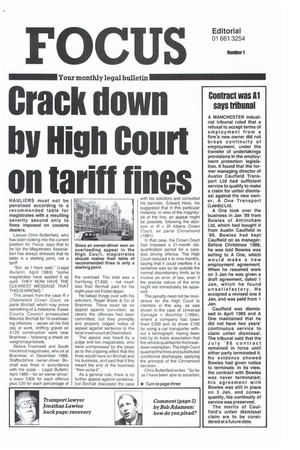Crack down by igh Court on tariff fines
Page 3

If you've noticed an error in this article please click here to report it so we can fix it.
HAULIERS must not be penalised according to a recommended table for magistrates with a resulting severity second only to fines imposed on cocaine dealers.
Lawyer Chris Butterfield, who has been looking into the current position for Focus, says that to be fair the Magistrates Association has always stressed that its table is a starling point, not a tariff.
"But, as I have said," (Legal Bulletin, April 1989) "some magistrates have applied it as such. THEY NOW HAVE THE CLEAREST MESSAGE THAT THIS IS WRONG."
This arises from the case R v Chelmsford Crown Court, ex parte Birchall, which may prove something of a milestone. Essex County Council prosecuted Maurice Birchall for 10 overloading offences seven on his first day at work, shifting gravel on A120 construction work near Braintree following a check on weighbridge tickets.
Before Freshwell and South Hinckford magistrates, who sit at Braintree, in December 1988, Staffordshire owner-driver Birchall was fined in accordance with the scale Legal Bulletin, April 1989 for an owner-driver: a basic E400 for each offence plus £20 for each percentage of the overload. The total was a horrifying £7,600 not much less than Birchall paid for his eight-year-old Foden tipper.
He talked things over with his solicitors, Roger Brook & Co of Braintree. There could be no appeal against conviction, as clearly the offences had been committed, but they promptly and properly lodged notice of appeal against sentence to the local crown court at Chelmsford.
The appeal was heard by a iudge and two magistrates, who were unimpressed by the pleas as to the crippling effect that the fines would have on Birchall and his business, and said that if this meant the end of the business "then so be it".
As a general rule, there is no further appeal against sentence, but Birchall discussed the case with his solicitors and consulted his barrister, Edward Hess. He suggested that in this particular instance, in view of the magnitude of the fine, an appeal might be possible, following the decision in R v St Albans Crown Court, ex parte Cinnamond (1981).
In that case, the Crown Court had imposed a 21-month disqualification period for a careless driving offence. The High Court reduced it to nine months, saying that it could interfere if a sentence was so far outside the normal discretionary limits as to involve an error of law, even if the precise nature of the error might not immediately be apparent.
The penalty need not be monstrous for the High Court 10 interfere in this way, as was shown in the case of Universal Salvage v Boothby (1984), where a company had been fined £200 and its driver £100 for using a car transporter without a tachograph, having been told by its trade association that the vehicle qualified for the breakdown exemption. The High Court quashed the fines and substituted conditional discharges, applying the principal of the Cinnamond decision.
Chris Butterfield writes: "So far as I have been able to ascertain,




















































































































